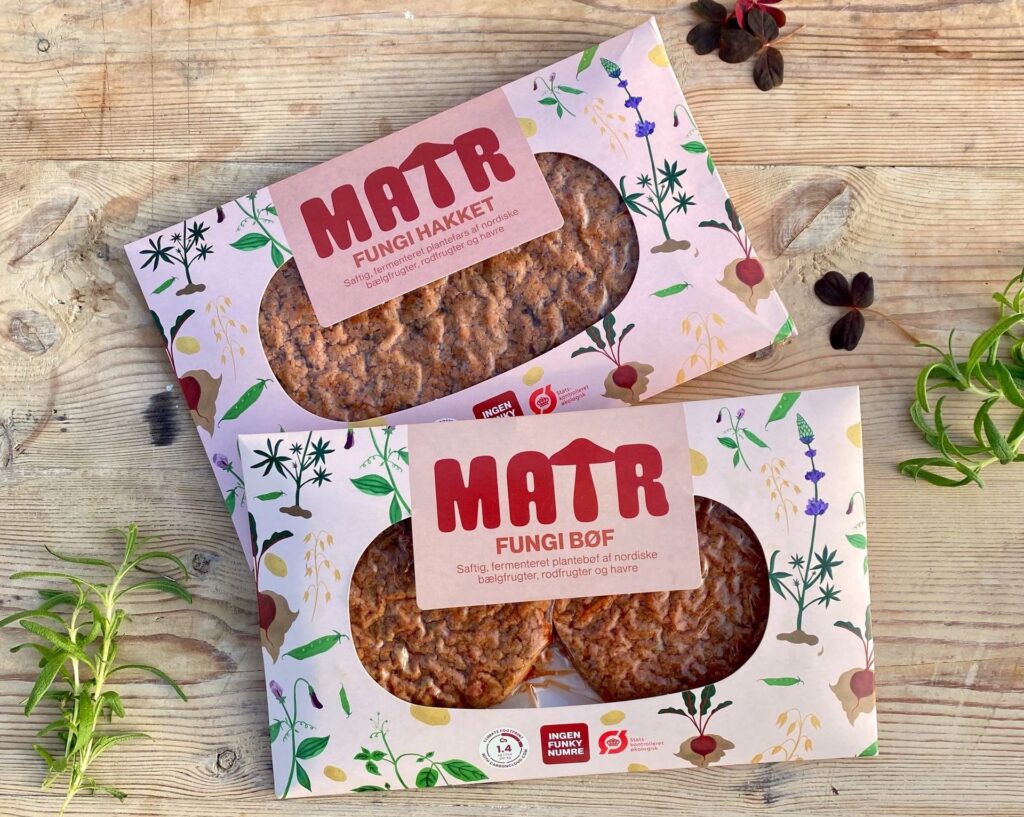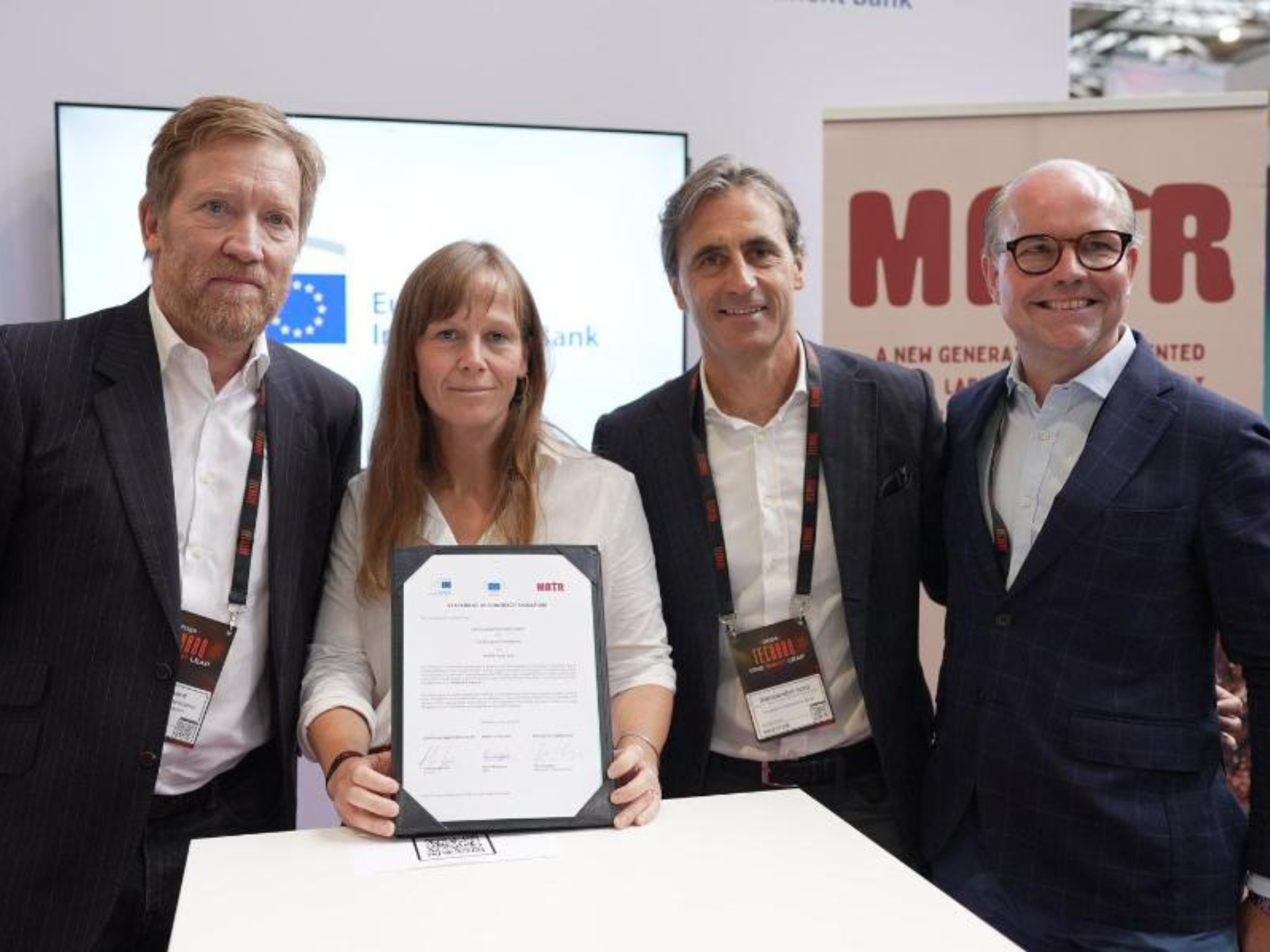4 Mins Read
Danish meat analogue startup Matr Foods has received €20M in debt funding from the European Investment Bank to open a large-scale mycelium meat facility.
Mycelium meat maker Matr Foods has received a €20M loan from the EU’s lending arm to support the construction of its first commercial-scale factory.
The Copenhagen-based producer, which currently offers a burger and mince made from fungi fermentation, has been operating from a pilot plant since its launch in 2021. But it recently indicated its intention to move to a bigger facility in 2026 to scale up production.
Now, the debt funding from the European Investment Bank (supported by the InvestEU scheme) will allow it to build this factory, where it hopes to produce over 3,000 tonnes of clean-label meat analogues annually (up from 30-40 tonnes at its existing pilot plant), while investing further in R&D.
”We are thrilled that the EIB, with its strong support, enables us to take the production to scale as fast as possible,” said Matr CEO Randi Wahlsten, a former Arla executive who established the brand with Noma co-founder Claus Meyer, Morten Sommera, and Rasmus Toft-Kehler.
How Matr Foods upcycles food with fungi

To make its mycelium meats, Matr Foods employs a solid-state fermentation process by inoculating upcycled ingredients like beetroots, potatoes, lupins, peas and oats with fungi spores.
Tiny roots called hyphae make up the mycelium and break down the nutrients in the mix, a process that releases flavour-packed amino acids and starches that enhances browning when cooked. The mycelium additionally binds all the ingredients together to create a juicy texture.
Matr Foods says the process allows it to reduce food waste, limit the amount of processing, amp up nutritional attributes, and create better-tasting meat analogues. It adds beet juice, salt, thyme and garlic powder to the resulting products, which have 2.5g of saturated fat (0.5g saturated) and 10g of dietary fibre. In contrast, Danish plant-based leader Naturli’s burger has 11g of saturated fat and 1.8g of fibre.
“Our products have been received overwhelmingly well by chefs, restaurants and consumers, clearly confirming the appetite for cleaner, healthier and more juicy alternatives to meat,” said Wahlsten.
Matr Foods’ burger patty and mince are available at Danish restaurant chains like Gasoline Grill, Rørt, and Gao Dumpling, as well as at all Sticks’n’Sushi locations in Denmark, Germany and the UK. The company also sells the products for home use through e-tailer Nemlig.com.
Moreover, its meat analogues generate 1.6kg of CO2e per kg, a climate footprint 94% lower than beef. According to the EIB, this would help reduce the environmental impact of European meals by more than 100,000 tonnes of CO2e per year, aligning with the bloc’s Farm to Fork strategy and bioeconomy goals under the EU Green Deal’s target of reaching net zero by 2050.
EU opens its wallet to increasingly attractive fermentation sector

Matr Foods claims this is the first time the EIB has invested in a plant-based meat company. The EIB’s financing is based on the EU’s policy objectives, with projects boosting competitiveness, driving innovation, promoting sustainable development, and supporting a just transition to climate neutrality.
The InvestEU initiative, meanwhile, leverages private and public funds to support a green economy, generating additional investments in line with EU policies. It bridges all EU financial instruments together, comprising the InvestEU Fund, InvestEU Advisory Hub, and InvestEU Portal. The fund is implemented via financial partners who invest in projects using the EU’s budget guarantee of €26.2B.
“Plant-based meat alternatives not only have high potential for growth, but also bring environmental and health benefits,” said EIB vice-president Ioannis Tsakiris. “When it comes to financing the green transition, innovation is a key part along with agriculture. MATR brings these two priority areas together and we are happy to support its endeavour.”
The bank’s support comes two months after Matr Foods received an initial investment from Novo Holdings, the venture arm of medical non-profit the Novo Nordisk Foundation. It has previously also netted state funding via the BioInnovation Institute.
Fermentation companies have become increasingly popular with investors this year, obtaining more capital in the first half of 2024 than they did in all of 2023. They have also raised twice as much as plant-based companies and over three times more than cultivated meat startups.
Christian Poppe, public affairs and sustainability director at Germany’s Formo, which closed a $61M Series B round last week, told Green Queen that fermentation is exciting to investors because it’s easier to scale, and enables a faster path towards price parity with conventional animal products. “Because it’s not entirely new to consumers, it holds great promise for rapid consumer acceptance and uptake,” he added, touching upon fermentation’s ancient roots.
Swayed by these trends, the EU itself has been ramping up investments in fermentation this year. Denmark, meanwhile, is the first country to introduce a national action plan to transition to a plant-based food system, which involves a focus on vegan school meals, chef training, increased exports, and investment in R&D. And earlier this year, Denmark also became the first to announce a carbon tax on meat and dairy production, in its bid to cut emissions from its agriculture sector.



